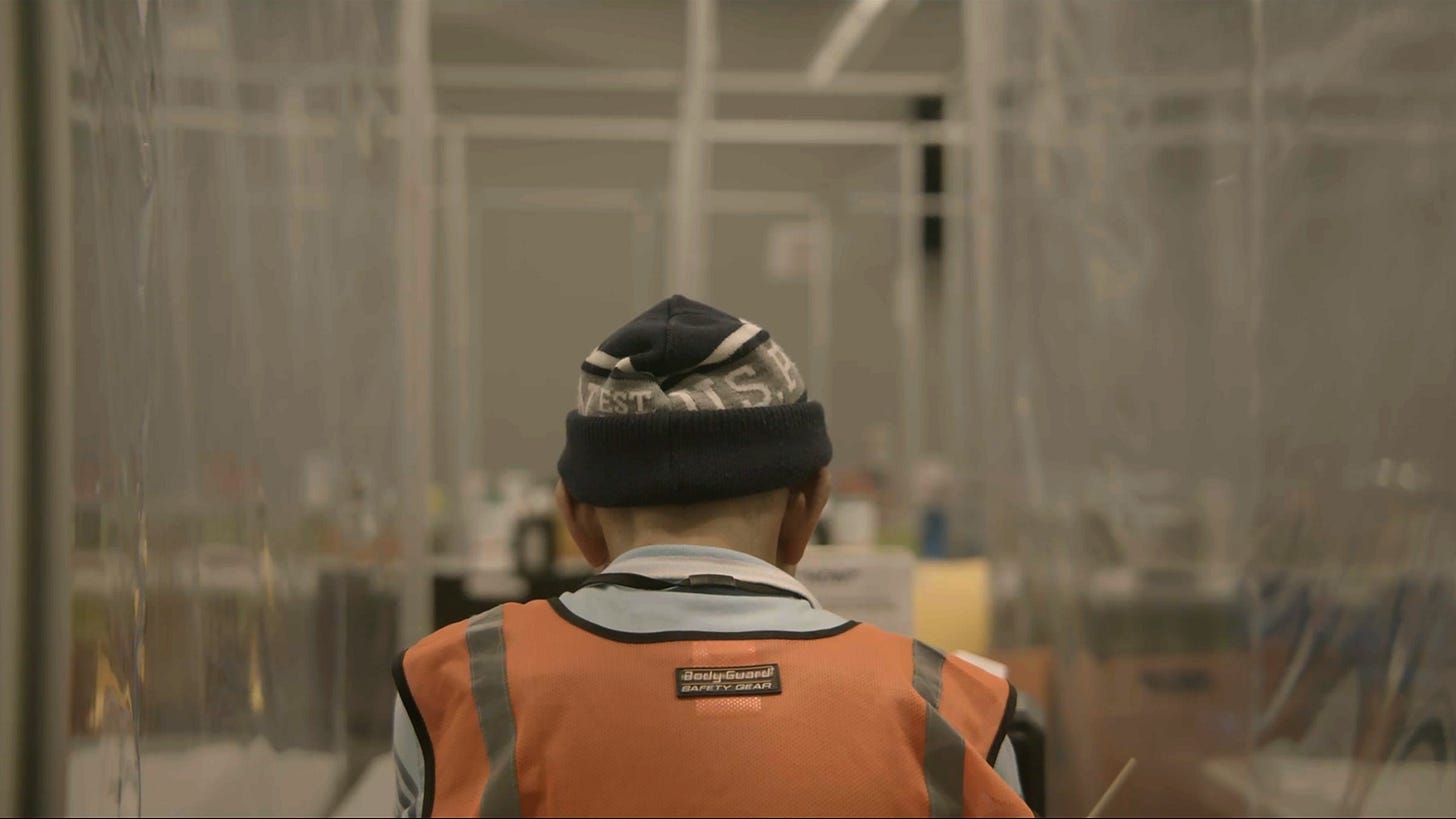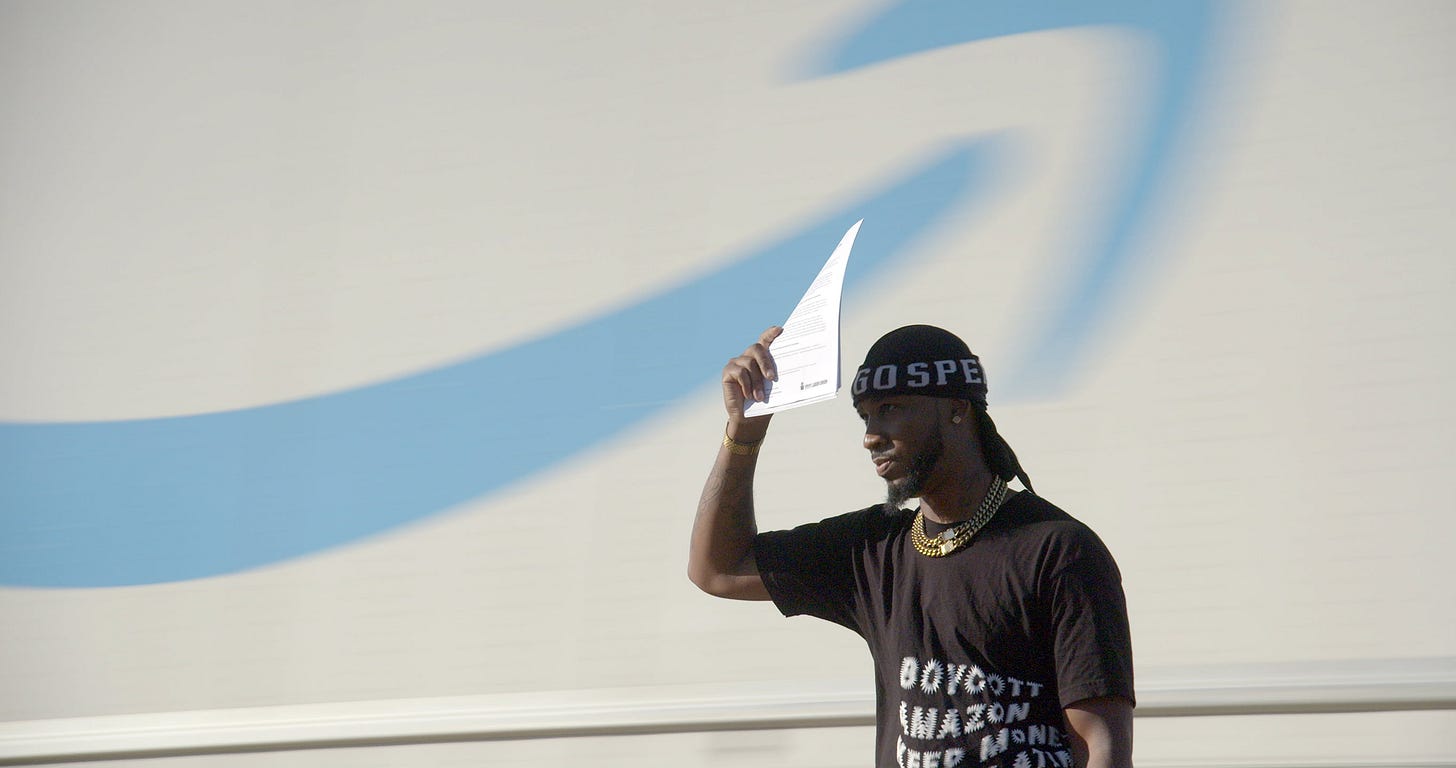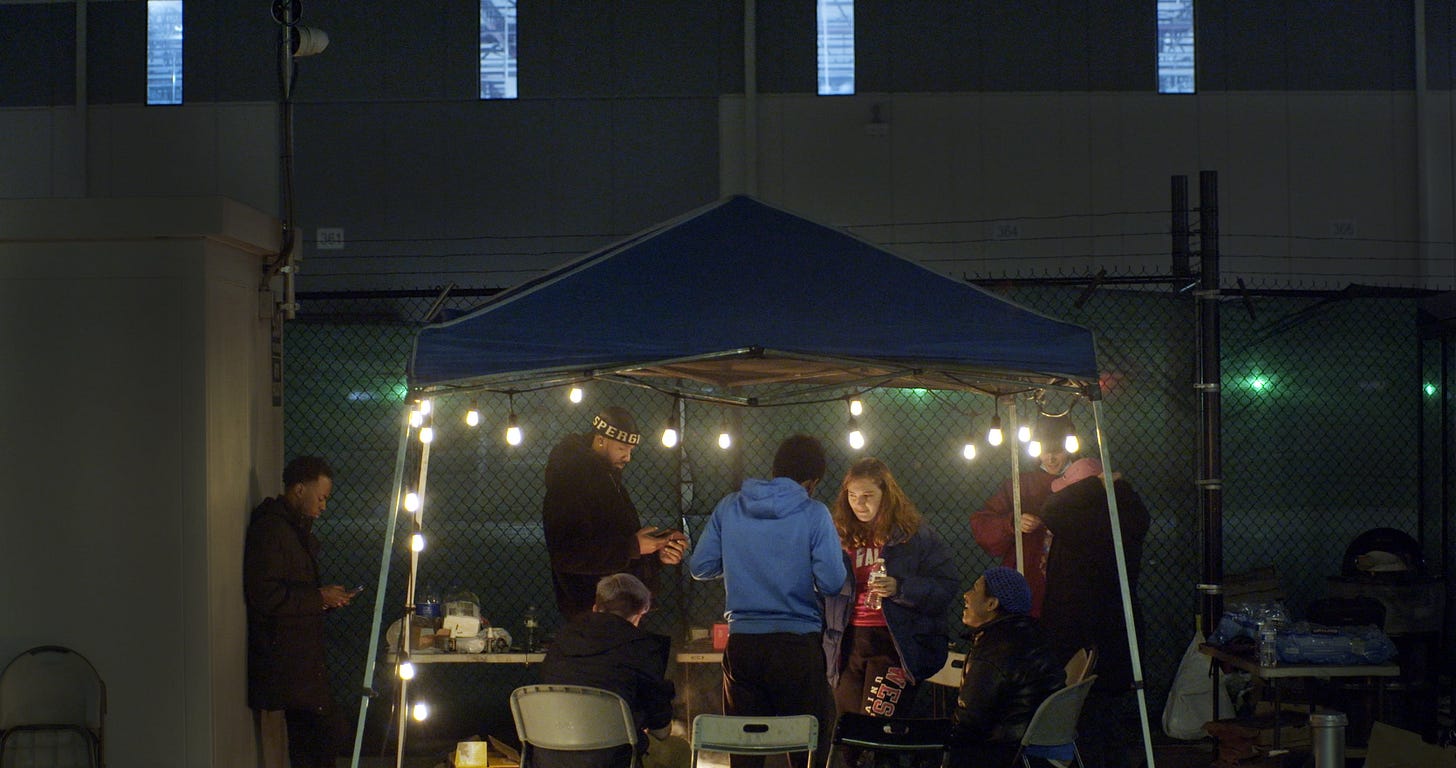I’m heading home from Socialism 2025, a conference that gathered all my internet mutuals and personal political heroes into one labyrinthian hotel in Chicago. We shared the space with a group of dance moms and their daughters, as well as an exquisitely dressed Black church, setting the scene for many charming interactions in the elevator.
I didn’t really mean to watch Union on the last night of the conference. I arrived late to Robin D. G. Kelley’s panel at the same time, and when I found out it was full, wandered down the hallway and joined an audience that was already several minutes into the movie. I’ll admit, I am reviewing this film without knowing how it starts.
Directed by Brett Story and Stephen Maing, the documentary follows the organizing committee of the Amazon Labor Union as they work toward their historic winning vote at Staten Island’s JFK8 plant in 2022. The ALU’s first president, Chris Smalls, is ascendant in his meteoric rise to international public figure, and he’s as charismatic on camera as you’d expect.
His scrappy co-organizers—a group that includes Jason Anthony, Angelika Maldonado, Connor Spence, and Madeline Wesley—fall across a spectrum of race, gender and education. These differences, along with their varied positions in the workplace, shape their opinions on the best strategy for the union; which brings tension and conflict as the group struggles toward a risky, daunting, perhaps even impossible goal.
In one scene, the ALU workers meet with an unnamed, larger union in New York, who they hope will lend support and solidarity to their cause. After the off-camera conversation, the workers emerge feeling frustrated. The union representative treated them with condescension, they say; speaking to them like children who don’t know what they’re doing.
But as these workers will demonstrate, they have a thorough understanding of the goal. Tired of waiting for the specter of an established union to swoop in and organize their workplace, the ALU is stepping up to do it on their own. They will form a new, independent union with no institutional connection to a larger network of organized workers.
This resembles the strategy of Philly Workers for Dignity, the organization that supported me through my own union campaign back in 2019. Dignity functioned as a workers’ center and independent union; offering volunteer mentorship and some legal resources to unorganized workers who wanted to start their own workplace campaigns. Just like the ALU, Dignity drew contempt and criticism from many more established unions in Philadelphia.
When I approached unions for support as an unorganized barista, it was difficult not to conclude that the organized labor institutions around me did not believe workers could—or should—lead their own workplace fights. If unorganized workers like me came to these unions for help, we might be lucky to get pro-bono advice from individual organizers who personally cared for us. But generally, if we wanted to access the union’s resources and institutional support, we’d hear that “the juice isn’t worth the squeeze.” New organizing campaigns had a high risk of failure, so unions were not willing to take them on, even if that meant turning away a new generation of workers who were ready and willing to join the labor movement.
Watching the ALU organizers face this same rejection and contempt, I felt their frustration on a personal level. It was an inspiring frame for the rest of the movie, in which the scrappy group of underdogs would go forward with their fight and eventually prove everybody wrong. It’s a path the directors could easily portray as clear-cut, but I admire the moments when Union chooses to center the mess.
Natalie Monarrez, an early member of the organizing committee, talks about feeling demoralized by the group’s internal power struggle. She butts heads with Smalls in particular, and often finds her opinion at odds with her young, white, highly educated coworkers. At one point Monarrez, a middle-aged Latina, is revealed to be living out of her car. By the end of the movie, Monarrez has left the union altogether, and she tells her former co-organizer that she will actively encourage her colleagues to vote “no” in the upcoming election.
On top of the interpersonal struggles within the union, the ALU also faces many procedural challenges trying to win their election through the National Labor Relations Board. From gathering petition signatures to casting an official vote, the film candidly shows the workers jump through confusing legal hoops, while Amazon’s team of high-powered lawyers and union-busting professionals works to head them off at every turn. The union faces both legal and illegal challenges, and workers are frustrated by their lack of power to combat the latter.
At the end of this David and Goliath fight, Union wraps on a cathartic moment of victory. I felt moved by the image, which reminded me of Volkswagen Chattanooga workers celebrating their winning NLRB vote a little over a year ago. The bargaining units at JFK8 and Volkswagen are roughly the same; highlighting the extraordinary task of organizing 8,000 workers without help from a larger union. I shed a few tears thinking about how much hope I had shared with workers in that moment. It was real power, and it was intoxicating.
But as the credits rolled, I still had questions. In the years since the ALU won at JFK8, Chris Smalls had become an increasingly controversial leader, and workers had pushed for internal reform and managed to win new leadership for the union. More recently, the ALU had given up its independent status and become a Teamsters local; additionally forming a partnership with the United Electrical workers. This wasn’t far off from Dignity, my old union, which had eventually dissolved and transferred its one Philadelphia local to Workers United.
I approached an ALU organizer after the screening, and I was thrown when he casually told me, “I hate this movie.”
Intrigued, I pressed for more. The organizer said the movie didn’t capture some of the fundamental issues within the ALU itself. He believed the organizing committee had made early mistakes that were now coming back to bite them; three years into stalled contract bargaining, the period when many companies are able to demoralize and overturn about half of new unions that win an NLRB vote.
The ALU had championed a public campaign that appealed to big, existential issues with Amazon as a company. Much of their early momentum was wrapped up in Chris Smalls being fired illegally from the plant, and his personal campaign for justice helped draw the eye of a global audience. It became a referendum on Amazon.
What was ultimately a winning strategy came at the expense of the organizing committee building deep, internal relationships within their own bargaining unit. As a result, new rank-and-file union workers at JFK8 were not inoculated for the fight that would follow the NLRB vote, and were vulnerable to the wave of union-busting to come.
Union would be a very different story if it centered this misstep, or stretched into the fight for a contract; the same frustrating spot where Volkswagen Chattanooga workers are currently stuck. This part of the fight simply doesn’t make for a good movie. It’s not glamorous or feel-good, like the cinematic moments on a picket line. The contract fight looks like endless delays and stalls, arguing over numbers and legalese, and fielding frustrating conversations with union members who were promised a path to better working conditions and have yet to see anything in return for their struggle.
As a creator of union propaganda myself, I struggle with the line between telling the truth and focusing on what’s idealistic. The joy of winning a union vote, or a strike demand, feels like nothing else. I believe that feeling, if properly bottled, can carry a worker through the deep lows that will inevitably follow in a union fight. It’s tempting to focus on that dreamy horizon, and tiptoe around the messy conversations, out of fear of demoralizing workers.
But good organizers know that you have to tell the truth. Workers must be fully inoculated; with both the life-giving potential for what they could win, and the poisonous reality of what could go wrong. If they’re not prepared for venom, they won’t survive the infection.
When Union really shines, it’s in the moments that highlight the mess: the internal contradictions, power struggles, personalities, and arcane beauracratic systems that underpin every union movement. These truths are what give life to the moments of victory; they can only exist together, not as a neatly wrapped story with a beginning and end, but an endlessly intertwined set of joys and hardships that make up the union struggle.
The hard reality is that labor organizing is difficult and taxing in many different ways, and it never fucking ends. There is no point at which workers will coast, and become passive participants at work, the way they were before the union. They are active now; competitive players in the struggle for dignity and liberation, and the moment they get complacent is when the things they’ve won start getting rolled back.
I don't think this has to be demoralizing, either: there is power in the realization that you are awake, alive, and your actions make the world move. If there were a perfect piece of union propaganda, I think it would help a worker realize that going back to brunch is a death sentence. The joy is the struggle itself, and it’s the work of our lives.
Labor Intensive Recommendations
Itinerant Songs by Terra Oliveira — new poetry from a comrade with my print on the cover!
Poser Ethics by Rayne Fisher-Quann — on reading, and on being seen reading.
Not Your Guru — Cheryl Rivera interviews Joy Jones, whose talk at Socialism conference blew my mind.









This especially resonates after watching DC33 in Philly concede their strike on a terrible deal this morning